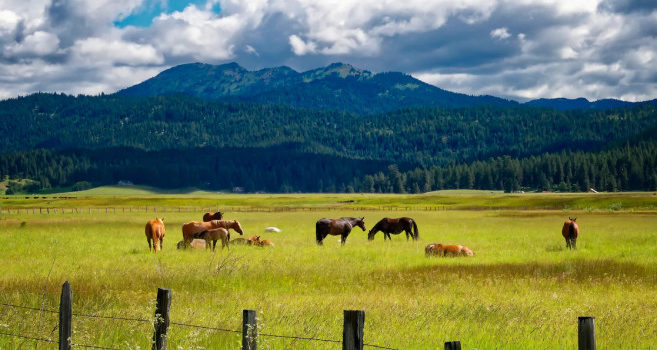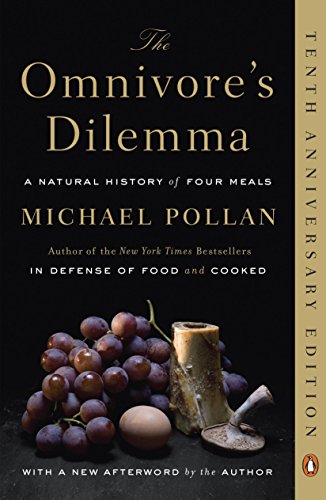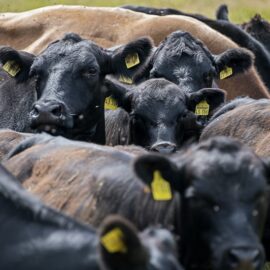

This article is an excerpt from the Shortform summary of "The Omnivore's Dilemma" by Michael Pollan. Shortform has the world's best summaries of books you should be reading.
Like this article? Sign up for a free trial here .
What is pasture management, and what role does it play in sustainable agriculture? Learn about proper pasture management and its benefits.
Grazing Management
Salatin practices “management intensive grazing,” which involves rotating animals through different pastures at various intervals. This requires using portable fencing and moving animals every day, as well as understanding how grass grows and responds to grazing.
- Grass has a spurt of growth after animals have grazed the first time, or taken a first bite, and after the grass has rebuilt its reserves and root mass.
- Then growth slows down again and the grass gets ready to seed.
To manage pastures effectively, it’s necessary to keep track of the grazing and stages of growth and recovery of each section, which varies according to the amount of rainfall and season. A farmer knows the average amount of forage a cow will eat in a day (a cow day) and calculates how many cow days each pasture will provide. Grazing the optimal number of cows at the optimal moments yields tremendous amounts of grass while also improving the quality of the land.
Polyface Farm achieves as much as 400 cow days per acre (compared to the county average of 70), in effect expanding the farm without adding new acreage.
If the 16 million acres now being used to grow corn to feed animals became well-managed pasture, that would remove 14 billion pounds of carbon from the atmosphere a year. This is comparable to removing four million cars from the road.
Benefits of Pasture Management
Poor pasture management causes problems.
- Grasses shortened by overgrazing have weak root systems for drawing water and minerals, so the grass deteriorates and can dry up.
- Also, grasses favored by livestock – clovers, bluegrass timothy — weaken and disappear. On the other hand, undergrazing also leads to lower quality grass when some varieties crowd out others.
- Wild populations of grazing animals moved regularly to new territory, or were forced to move like buffalo were due to predators.
Grass’s contrast with corn couldn’t be sharper.
- Unlike corn, growing grass doesn’t lend itself to the industrial system benefits of consistency, mechanization, and economies of scale.
- Grass isn’t particularly portable, storable in large quantities, or traded as a commodity.
- Unlike corn, it doesn’t shore up the larger economy — for instance, the chemical and oil industries, or pharmaceuticals.
- Grass quality is variable, and grass can’t be broken down and processed into value-added foods.
- The skill and local knowledge required to manage grass are hard to standardize.
- Growing grass follows the cycles of nature rather than the logic of industry.
Animals in Pasture Management
In a similarly intricate way, Polyface Farm manages its animals. The various animals and the grass are interdependent, benefiting each other and the land while producing food.
Chicken pens housing broilers are moved around the farm regularly — 10 feet per day — so they can eat grass and fertilize it with their manure; the birds avoid pathogens, and get nutrients from the varied grasses plus bugs, but are moved before their pecking and manure can destroy it.
Another example of interdependence is the way the farm handles rabbits for sale as meat to restaurants. The rabbits live in cages suspended over wood chips, in which their manure and urine collects; chickens scratch in it, which helps turn it into compost.
The farm grazes turkeys in a grape orchard, where they eat bugs, cut the grass, and fertilize the vines.
Manure that collects in cattle sheds, where cows spend winter, is layered with straw and corn, which ferments; then pigs are allowed to root in the manure for the corn, and this aerates it, creating a rich compost in a few weeks. This can later be spread on pastures, which will enhance the grasses, which feed the cows, chickens, and turkeys.
Nature’s Efficiencies
In such an interconnected system as pasture management, you can’t change one thing without changing the others.
For example, if the farm added more chickens, their nitrogen-based manure would be too much for the pastures to handle and it would kill the grass. Also, the farmer would need to add more cattle to produce the manure and insects to feed the chickens, or their eggs wouldn’t be as good. This is sustainable pasture management.
The farm is more like an organism than a machine; it works only on a smaller scale.
Natural systems are efficient in a different way from industrial systems; for instance, in nature, there’s no waste problem. One animal’s waste becomes another’s food source; turning cow manure into eggs is efficient, as is using the same pasture repeatedly to produce different things: cows, pigs, broilers, eggs, turkeys.
In an industrial system, simplified by creating a monoculture, the only way efficiency is measured is by yield.
But natural systems’ efficiencies grow from interdependence. You need multiple species complementing each other, to eliminate the need for fertilizer, pesticides, drugs, etc. The animals accomplish this by behaving naturally, doing what they are designed to do.
Pastoral farming and pasture management is labor intensive compared to the more mechanized and standardized industrial farming system.
———End of Preview———

Like what you just read? Read the rest of the world's best summary of Michael Pollan's "The Omnivore's Dilemma" at Shortform . Learn the book's critical concepts in 20 minutes or less .
Here's what you'll find in our full Omnivore's Dilemma summary :
- What does Omnivore's Dilemma mean?
- Why is industrial farming so bad for you and the environment?
- How did corn and its byproducts (like corn syrup) end up in tens of thousands of foods?
- How is Industrial Organic food like at Whole Foods not much better than massive industrial farming?
- What happens when you try to forage for your own food?






